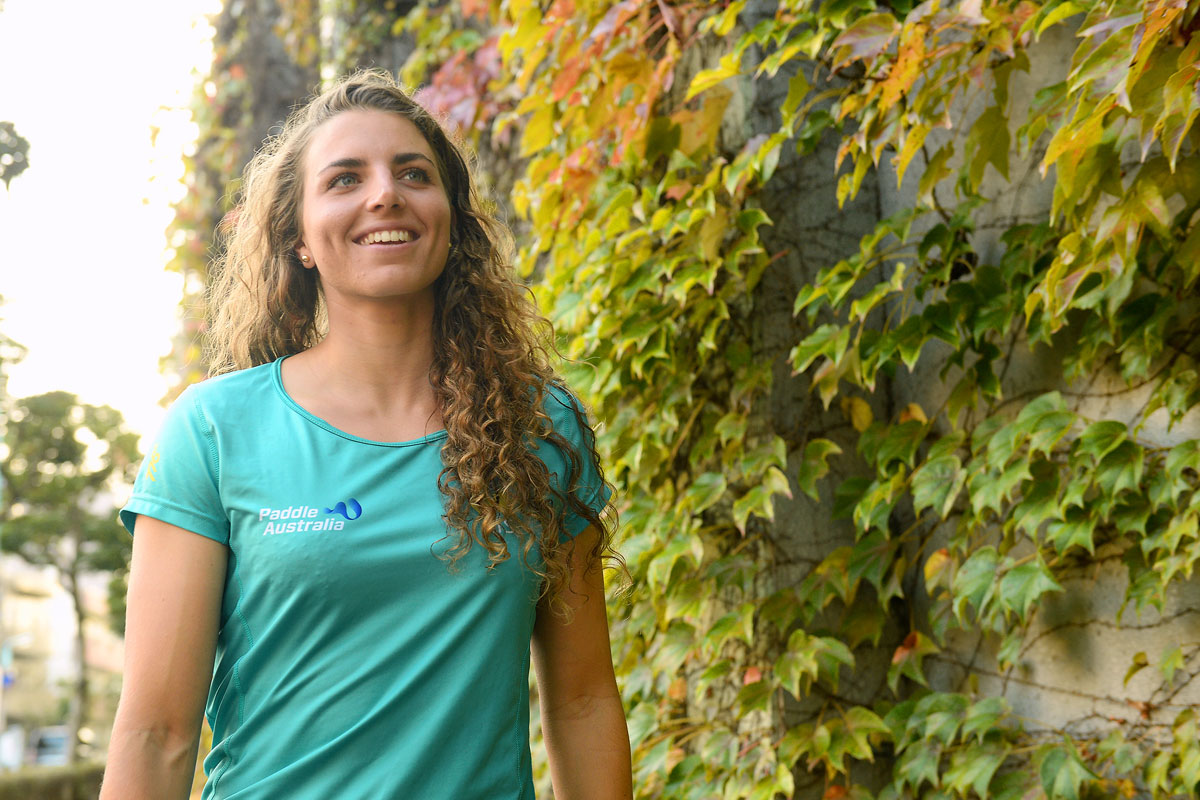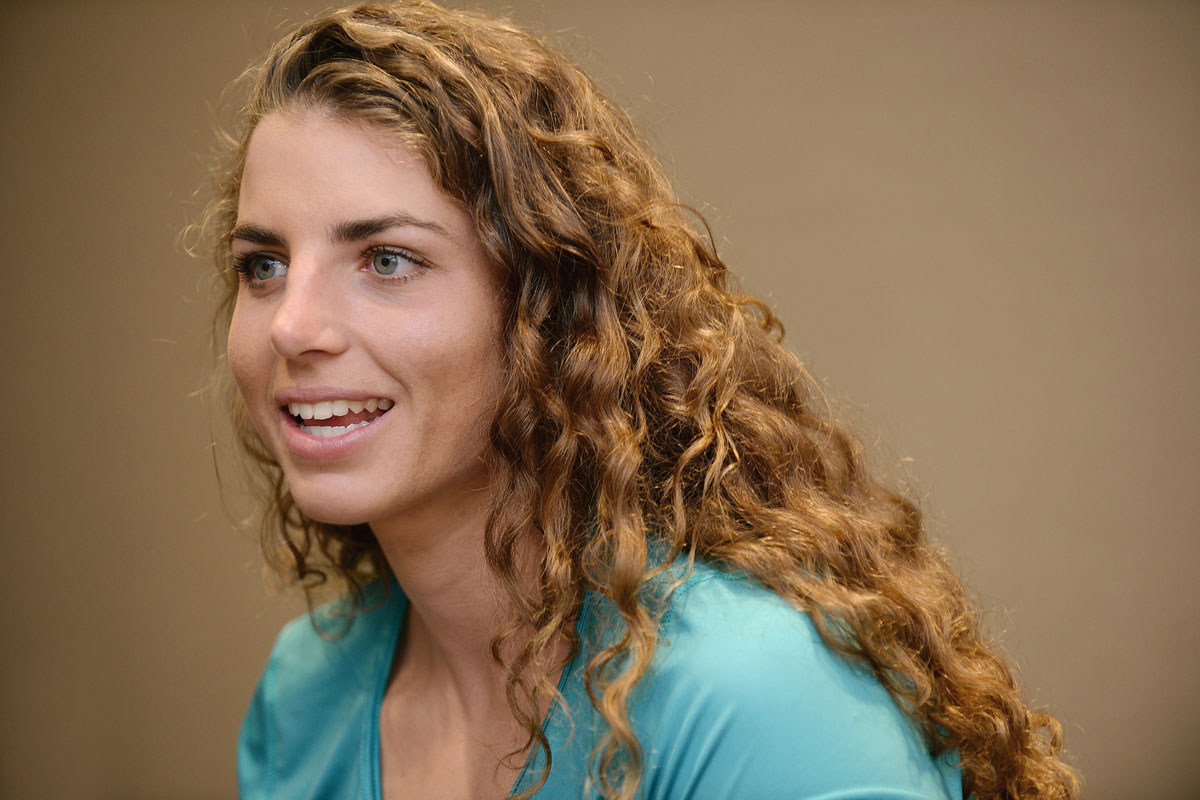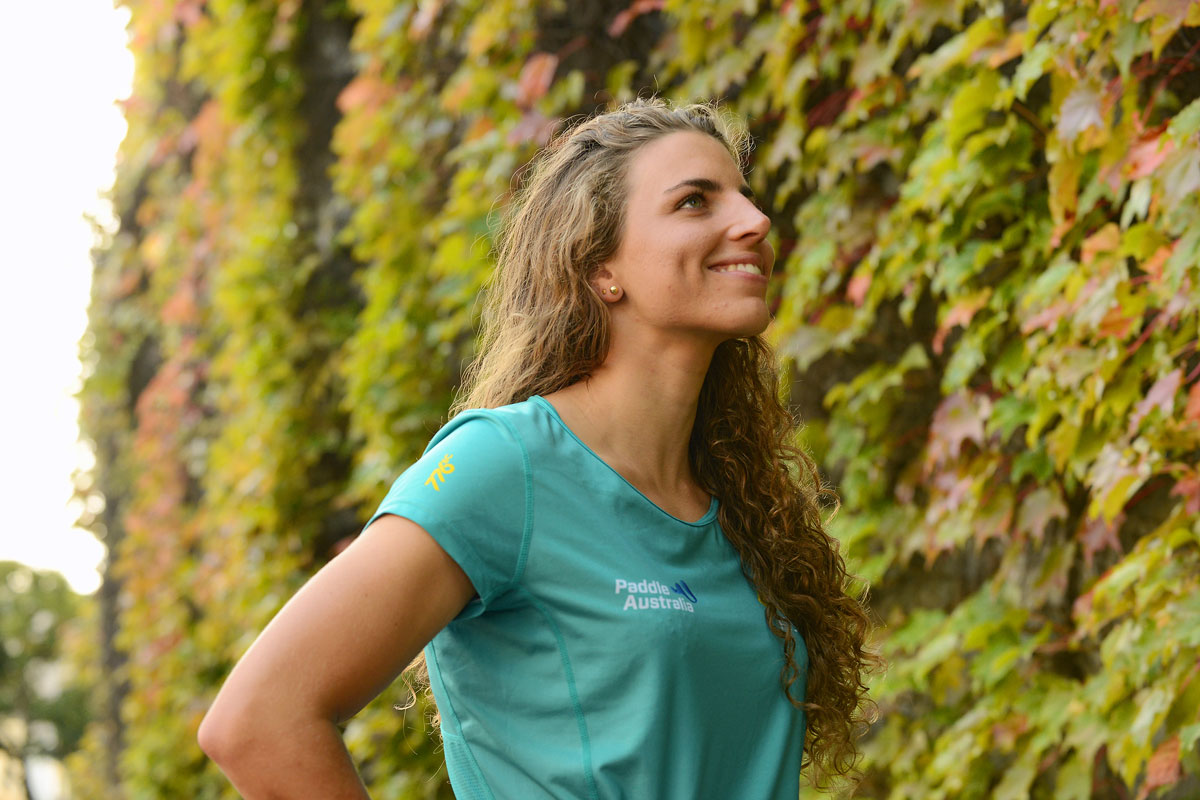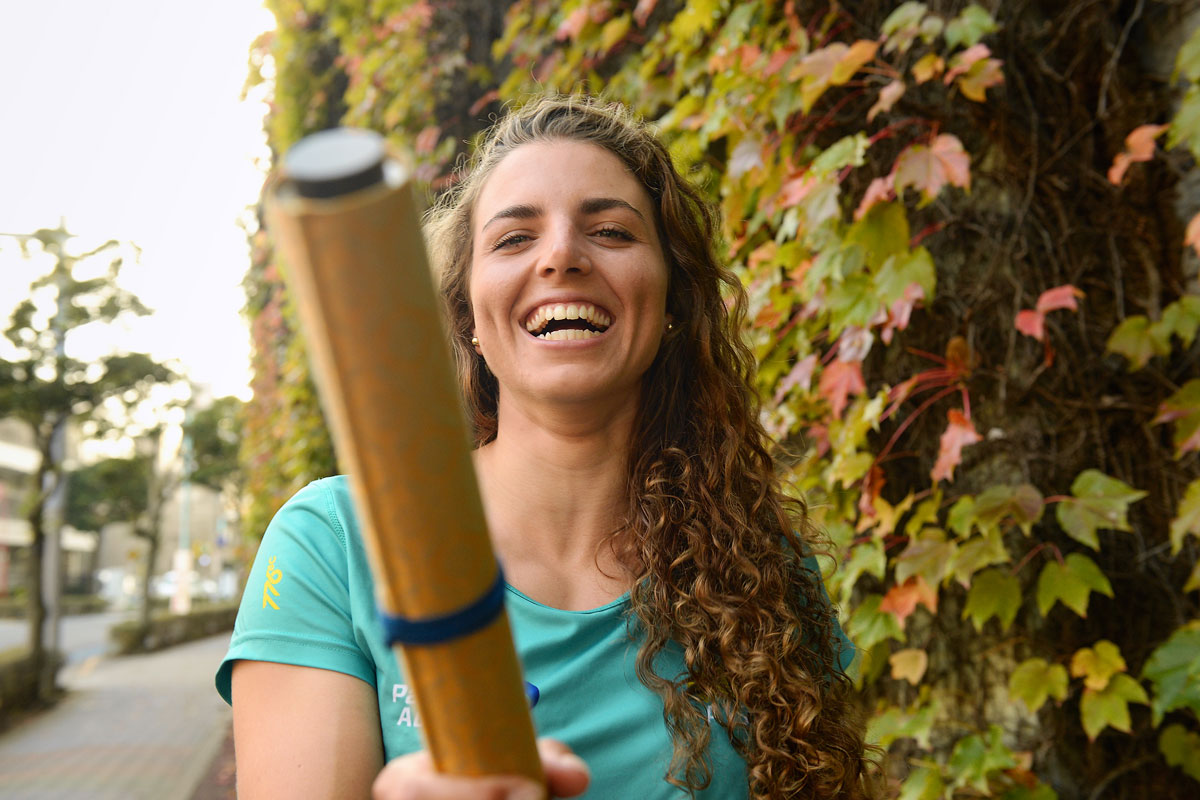

© Yuki Saito

There are many incredible and amazing moments in sport, but then there have also been really challenging training sessions or training camps that pushed me and tested me both physically and mentally. I grew up engaging in different kinds of sport, and what I learnt, particularly from my parents, was if there was something that I wanted to try, I should go ahead and do it and stick to it until my goal was achieved.
In canoe training sessions, after doing 12 laps as hard as we could, the coach – my mum – would say, “Now, this one has to be your best time.” It is just a very taxing and exhausting exercise to mentally tell yourself, “I can do one more, and I can go harder and faster, and fix the mistakes that I have made.” And when I have been able to do that and prove to myself that, even though I am exhausted, it is all in my head. So, even if I am physically exhausted, I can concentrate and do the next lap the way I see it in my mind.
In those hard sessions or in those hard races where it has not gone to plan, or I have been really nervous, my mum would just reassure me, “You have done all the training. You know how to race, and you just need to keep it simple. Break it down to the simple acts. You need to get to the start line. You need to breathe. Do what you know how to do”.
Even as I work toward a goal that I have set, sometimes it is easy to just say, “It’s really difficult. It’s really hard, so I am just going to stop”. But having a goal and having a vision for where you want to go allows you to keep going and allows you to push through those hard moments. So now, as an elite athlete and as a more experienced athlete going to the third Olympic Games, my goal setting is more specific. Now, I am trying to make improvements in all areas of my physical, mental and technical preparation, and that is what keeps me on track.
When you look at some of the most amazing Olympic moments, yes there has been Michael Phelps or Usain Bolt breaking records and everything. There has also been so many more amazing moments of sportpersonship, of athletes falling over during a running race and helping each other up to finish the race. And sometimes those are the moments that people remember most versus who won the race. It is about how you react to a bad situation that speaks a lot about yourself. Obviously for me the goal is to win a gold medal, but if I do not get there, I know that I have done everything in my power to do my best and to pursue excellence. Even if on the day it does not happen, I am proud to be the athlete that I am.


© Yuki Saito
We have always been active as a family, and I was surrounded by elite sport. Even as a child, I was able to set a visible goal of becoming a world champion or winning medals. Growing up multiculturally and multilingually, I can say with confidence that I naturally developed an ability to explore and respect new cultures too.
Both of my parents competed as slalom canoeists at the Olympic Games. My British dad is a five-time world champion in the K1 individual class. My French mum won bronze medal at the Atlanta 1996 Olympics. They had achieved great things in sport, so there were more expectations and pressures on me because I was their daughter. But, seeing an Olympic medal or a World Championship medal that they had won was quite powerful for me because I knew it was possible that if they had done it, maybe I could do it too”. Seeing them taking athletes to the Olympics as their coaches, I learnt the process of what it took to get there. I think that was really powerful.
I was born in France and lived there until we moved to Australia when I was four. After retiring, my parents became coaches. Even as a kid, we travelled a lot because we had to go with mum and dad where they were coaching. We missed schools here and there, but learning new languages and being in completely different cultures and environments definitely stimulated my growth as a child.
Australia is a pretty multicultural society as well, but I love to travel and discover new cultures and learn from different people as well. Even now, I can appreciate other cultures. I am maybe more open-minded than someone who has just stayed in the same country in their whole life. Having different cultures in myself helps to appreciate and respect others too. So, I love my roots and my background, and the opportunities that I have had growing up in Australia are massive.
I was also lucky that by going through the Australian school and sport system, I was able to experience many sport like gymnastics. Swimming is a sport that most kids get into because it is important to learn to swim in our culture. In my first swimming competition at school, I was maybe eighth or ninth. I wanted to train to be better at the competitions, so I think I was always a competitive child. When I was 11, I got onto the whitewater canoe course in Penrith, and I loved it from that point. I think I got off to a fantastic start because my parents taught me superior techniques and the right mindset for canoeing from the beginning.
What I think was instilled from my parents was: if I wanted to try a sport, I will try it, and I would have to commit to finish the term or the year or whatever the duration was that we signed up for. Maybe it is hard, and maybe it is not enjoyable at one point, but as you get better and as you improve, you start to enjoy it again, or you start to discover other things about yourself and learn to enjoy it more. Having a goal and having a vision for where you want to go allows you to keep going and allows you to push through those hard moments. I think I am who I am today because of my parents.

© Yuki Saito
My mum has been my only coach. She encourages me squarely as well as demands excellence every day. I think that is something that has made me the best as well. She expects excellence in every session. She is one of the women who have motivated and inspired me greatly. She knows how to encourage and push me – how to get me to be my best and achieve the best results. We do have arguments, but I know that she has the best intentions for me, so she wants what is good for me. As long as I keep working with the right attitude to achieve results toward the right goal, even if we might disagree, usually we communicate very well with each other that we can discuss it and work through it.
In 2010, when I was 16, I won a gold medal at the first Youth Olympic Games (YOG) in Singapore. Two years later, I won a silver medal at the London 2012 Olympic Games. I can say these medals were a wonderful reflection of our effort and the path that we had taken.
Later, I was appointed as Australia’s Young Ambassador and participated in the 2018 YOG. I served like an “older sister” to inspire the next generation of YOG athletes. Now it is called “Young Change-Maker” at the IOC. I was able to encourage, mentor and encourage other young athletes to have a wonderful, life-enriching experience at the YOG.
I am also on the Athletes’ Commission of the Australian Olympic Committee (AOC) and the International Canoe Federation (ICF). So, there are a few different roles where I get to contribute and have some input. It is up to me to be the voice of the athletes and pass that on to the ICF or the AOC. It has been hard to understand how the landscape works in terms of a federation, how that works – how rules change, how the processes are put in place, for example. It is interesting to see the other side of sport – how it all works of the administrative side. So, it has been a great learning experience.
I would not say that I started out with a vision or drive to be that kind of spokesperson or of being a role model for YOG athletes, but it comes with the territory in a way. You have some big results, like I guess for me, the gold medal at the 2010 YOG was my first experience on the Australian Olympic team, and then qualifying for London and winning a silver medal kind of catapulted me into the media a little bit. So, I had to grow up quickly, but it was also natural. I always want to be myself. I always want to be honest and speak my thoughts, my mind, but be respectful, be grateful. And so, you take on a role model role because of your achievements.


© Yuki Saito
I really like the All Blacks, New Zealand national rugby team, culture saying, “Leave the jersey in a better place”. In other words, when you leave the jerseys, or are done with your national representative kit, you are leaving more impact for the next generation; you are contributing to make it better. And I like that kind of idea that whatever it is we are doing, it needs to be positive for the next generation. I think that is always the goal – to try and improve in your sport by aiming for a better direction.
What I want to pass on to the next generation are sport values. Even if a child is not a talented athlete, it does not matter. They can learn so much just by participating, trying their best and seeing improvement. And just those little things can really translate into everything in life.
I think we are now in a society that is overprotective of kids at times. Children are not given the chance to experience small failures, which are essential in life. I think when we experience these things through sport, whether it be through injury or through personal setback in our life or a bad result, I think learning to accept it, move on, turn the page, and just keep going is super important. It translates everywhere – in life, in work and in relationships. I think sport teaches us so many values that are really important in life.
I am also constantly thinking about the issue of gender equality in sport. For a long time in canoeing, I was dissatisfied that gender equality was not being achieved in previous Olympics with three events for men and only one event for women. But now, Tokyo 2020 is the first Games where we see a gender equality. My constant goal is to have more women participate in canoeing and to spread the sport. I am grateful for the women in our sport and the future of our sport. Going forward, I hope to be able to contribute to that as well in some way. It would make me very happy if I could do that.


© Yuki Saito
The most important things that I learnt through sport are the power of goal setting, commitment, discipline to pursue that goal, and resilience – to try and keep pushing and not give up. A lot of people set a goal and forget about it in a month or they may not even try to achieve the goal. Because maybe it does not work straight away, they stop and give up. So, goal setting, commitment, discipline, and resilience. Getting back up when you have a bad race or when you have had a bad session or not got the mark at school that you worked for, or at work, you did not get that promotion. I think resilience is a really powerful one that is good for our mental health.
I think some athletes maybe do not realise this, but kids look up to you, and kids will learn from how you act. I think it is important to always lead by example and show respect to your competitors and show sportpersonship. Yes, we have bad days and you do not always have a perfect race, but life goes on; you can come back next time and have another go and you can go back to training and try and improve for next time. And it is not always about the gold medals. It is about the process that leads you to that, too. So, if my experience can help others then that is fantastic and that is what I want to be able to share with many people as well.
The behavior taken outside of competition is also very important. Let us say that someone comes up to me and wants to take a photo with me or chat. Even if I am having a bad day and am not in the mood, it will only take 30 seconds of my time to smile and exchange a few words. And you know, that might end up making me feel better, and as for the person who came up to me, it could make their day or even be something that they remember for the rest of their lives. I have seen athletes who will not give people five seconds to sign an autograph. What you do in your event – in my case, my actions on the water – says a lot about the athlete that you are. But what you do outside of your event says a lot more about what kind of person you are. So, it is important to have a goal and lead by example. Show respect and pursue excellence and show that drive and motivation to get there, but do it in a way that is kind as well.
A big one for me is to be myself. I am naturally happy, smiley and bubbly. I have fun. But I think it is also important to understand the situation I might be in. If I am doing media or if I am visiting and presenting somewhere, I think it is good to be prepared and always present well. I guess that comes with experience, but like I said, when you are just being yourself, it is easier. I guess I have always grown up with these values and respect, so then it is easy to pass them on. I am who I am. I am natural and authentic whether it is on the water, in the media or at home.


With British and French world-champion canoeists as parents, Jessica was born in France and moved with her family to Australia at four years old. During her childhood, she enjoyed swimming, gymnastics and other sport and switched to canoeing when she was 11 years old.
A five-time junior champion and has won a gold medal at the Singapore 2010 Youth Olympic Games, followed by a silver medal at the London 2012 Olympics, and a bronze at the Rio de Janeiro 2016 Games.
Jessica is Australia’s first YOG Ambassador, the IOC’s Young Change-Maker, and serves on the Athletes’ Commission of the Australian Olympic Committee (AOC) and the International Canoe Federation (ICF).